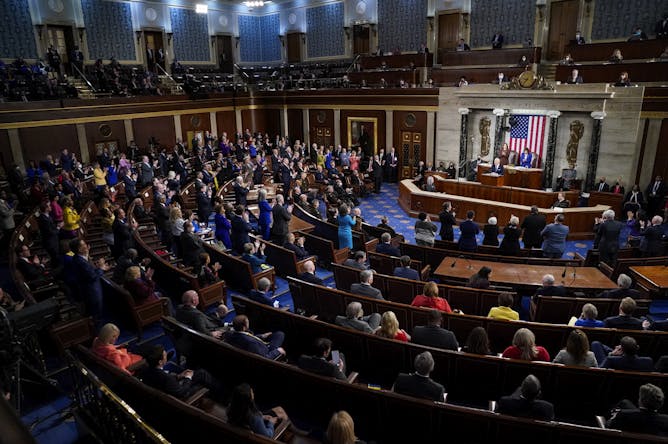|
The whisper campaign against Joe Biden running for a second term got louder in the past few weeks. “Quit, Joe, Quit! Biden could save the midterms with a one-term pledge,” blared an opinion column headline in The Washington Post.
If Biden isn’t running, he’s kept that to himself. That’s because the minute he announces he won’t seek reelection, he becomes a lame duck. And that’s a status no president would willingly embrace, writes political scientist Michael J. Faber of Texas State University.
Lame-duck presidents, Faber explains, don’t get much, if any, cooperation from Congress, while “the press treats lame-duck presidents as old news.”
Biden has a history of defying those who have written his political obituary. He did it in the 2020 presidential primaries, and he’s doing it right now with a string of legislative victories that few would have predicted just a couple of months ago. There’s a reason, Faber writes, that “only three first-term presidents have declined to run for a second term.”
It turns them into losers. And why would Biden want to do that?
Also today:
|

President Joe Biden delivers the State of the Union address in the U.S. Capitol on March 1, 2022, among many lawmakers who may want his job.
Jabin Botsford-Pool/Getty Images
Michael J. Faber, Texas State University
A combination of irrelevancy, powerlessness and derision is in store for a president who chooses not to run for reelection.
|
Politics + Society
|
-
Shannon Bow O'Brien, The University of Texas at Austin College of Liberal Arts
Photos showing what appear to be torn-up documents in two different toilets may provide more evidence of the former president’s habit of destroying his presidential documents.
-
D. R. Jones, University of Memphis
It’s a long-standing principle that people should be able to read the laws that govern them. But many technical rules and standards are hard to find and access, even for lawyers or court officials.
|
|
Environment + Energy
|
-
Tristan McKenzie, University of Gothenburg; Camilo Mora, University of Hawaii; Hannah von Hammerstein, University of Hawaii
It’s not just mosquitos. Flooding, extreme heat and other climate-related hazards are bringing people into contact with pathogens more often, and affecting people’s ability to fight off disease.
|
|
Science + Technology
|
-
Tim Gorichanaz, Drexel University
The late Christopher Alexander’s groundbreaking work on patterns has informed the development of technology for decades, but it’s the architect’s later work that holds the key to a healthier digital life.
|
|
Health + Medicine
|
-
Asaf Mazar, University of Pennsylvania; Wendy Wood, USC Dornsife College of Letters, Arts and Sciences
Understanding and changing the environment in which habits form is a critical step when it comes to breaking unwanted behaviors and forming healthy ones.
-
Kathryn H. Jacobsen, University of Richmond
Declaring monkeypox a national health emergency will allow the U.S. government to direct resources and funds where needed to help slow the spread of the virus.
-
Linda Quan, University of Washington
Many beaches are short on lifeguards this summer. An expert explains how to keep your loved ones safe in the water.
|
|